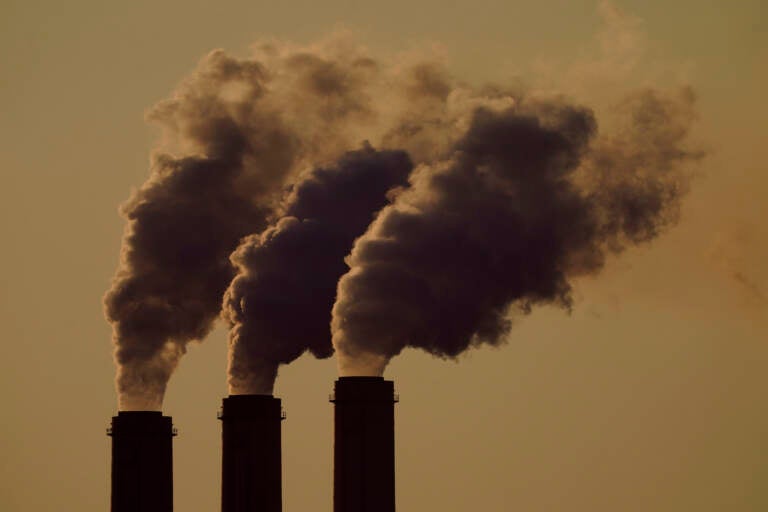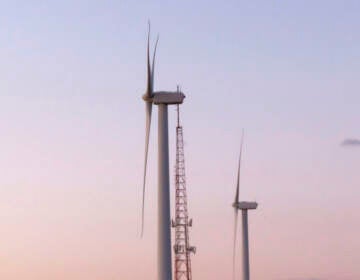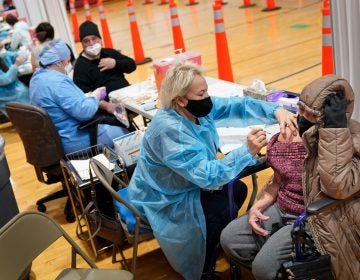N.J. might allow new fossil fuel plants, despite push for clean energy, zero emissions by 2035
Several elected officials sent Gov. Murphy a letter this week expressing their opposition of the proposed power plant in Brick City’s Ironbound section.

File photo: In this Saturday, Sept. 18, 2021 file photo, emissions rise from the smokestacks at the Jeffrey Energy Center coal power plant as the suns sets, near Emmett, Kansas. (AP Photo/Charlie Riedel, File)
After Gov. Phil Murphy announced plans this week to end the sale of fossil fuel-emitting vehicles in New Jersey by 2035, advocates say he should do more to prioritize environmental justice. That includes opposing plans for a new power plant in Newark’s Ironbound neighborhood.
The Ironbound — an ethnically diverse, immigrant-rich working-class neighborhood of about 50,000 people — is one of several places the state classifies as an “environmentally overburdened community” (EOC) due to its proximity to major highways and a high concentration of fossil fuel polluting facilities.
Advocates say with Passaic Valley Sewerage Commission’s proposal to build a fourth power plant near the Ironbound, there would be one polluting facility per square mile in the neighborhood’s four-square-mile radius.
JV Valladolid, a community organizer with the Ironbound Community Corporation, says people in the Ironbound suffer disparate health risks caused by harmful emissions.
“We congratulate New Jersey on taking steps forward towards environmental justice,” Valladolid said. “What really impacts our community, and our health and our lives, is that there’s the potential that new fossil fuel projects like the Passaic Valley Sewerage Commission will be approved. And so there’s a large and really threatening and scary contradiction there.”
Several elected officials, including Newark Mayor Ras Baraka and a host of Democratic state lawmakers, sent Murphy a letter this week expressing their opposition to the proposed power plant.
“We urge you to do everything in your power to protect the health of our most vulnerable communities. We ask [Passaic Valley Sewerage Commission] to withdraw its permit application to the NJDEP for a new methane power plant to demonstrate a good faith effort by the agency to explore alternatives and truly listen to the communities it will impact,” the letter reads.
New Jersey is still finalizing rules for a comprehensive environmental justice law enacted in 2020 capping the amount of polluting facilities in EOCs. Valladolid expressed concerns over a potential loophole that would allow facilities to open if a proposed facility brings significant economic value to a community.
On his monthly call-in show with WHYY News and other NPR affiliates, Murphy addressed advocates’ concerns.
“It’s been over two years since I signed the law. And my guess is we’re some number of months away until this is finally on the books,” Murphy said. “And because we have had this out for public comment, we have had reams of inputs, and I mean 400 pages single-spaced, this is a really hard one to put together. But we will get there. And again, no matter what form it takes, it will be the strongest environmental justice law in the country, as it relates to the specific projects.”
Alex Ambrose, a policy analyst with the New Jersey Policy Perspective, is also asking the Murphy administration to end a decade-old practice of re-allocating money from the state’s Clean Energy Fund to fill annual budget holes.
“In 2017, when he was running for governor, Murphy made a promise that he would immediately end the raids on the Clean Energy Fund. And he has not fulfilled that promise yet. So in two weeks is his budget address and we will see if he finally fulfills that promise because that source of funding will help reach a lot of his [climate goals,]” Ambrose said.
Ambrose adds that the Murphy Administration and state lawmakers should move quickly to set emissions benchmarks and craft climate enforcement laws before the end of the year.

Get daily updates from WHYY News!
WHYY is your source for fact-based, in-depth journalism and information. As a nonprofit organization, we rely on financial support from readers like you. Please give today.







